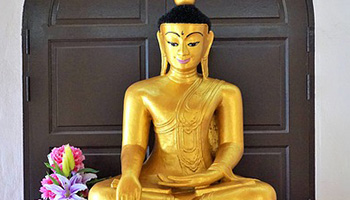
The best explanation of the Buddha’s teachings we receive the Buddha himself. Sanskrit teachings are called Dharma in Tibet – Cho. Both they mean “as is”. So Buddhism can be seen as a set of tools that allow us to perceive things as they really are, now and now. In Buddhism there is no dogma, and there is nothing that can not be questioned. Buddha’s teachings aim to complete the development and release of body, speech and mind. Buddha gave instructions adapted to three different types of people. Those who wanted to avoid suffering received instructions cause and effect, also called “Little Way” (Sanskrit: Hinayana). For those who want to do more for others, he taught wisdom and compassion (Sanskrit Mahayana).
When people believe firmly in the very nature of Buddha and that of others, Buddha taught the Vajrayana (Sanskrit Vajrayana). For them it appeared as forms of energy and light or directly transmitted his enlightened approach by the stream of consciousness. In the top-level goal is the full development of body, speech and mind, immediate ease the Great Seal (Sanskrit mahamudra). Diamond gives way to the modern world “effective methods that lead to a direct experience of the mind” – explains Lopon Tsechu Rinpoche, one of the most experienced teachers of Tibetan Buddhism. You will learn to see the world from a rich and unique perspective. Diamantvägen meditations develop a deep inner richness. To lead an undefeated and discreet mind, where there may be all enlightened action. Does Buddhism is a kind of philosophy, psychology or religion? Buddhism can be seen as a philosophy in the sense that his teachings are a unified and logical approach, but this is not just a philosophy. Philosophy can explain things on the formal set of words and ideas, while learning works with all Buddhas. Both philosophy and Buddhist practice lead to clear thinking, but only the latter can lead to permanent changes, because it gives us a practical key to handling everything that happens in everyday life. while learning works with all Buddhas. Both philosophy and Buddhist practice lead to clear thinking, but only the latter can lead to permanent changes, because it gives us a practical key to handling everything that happens in everyday life. while learning works with all Buddhas. Both philosophy and Buddhist practice lead to clear thinking, but only the latter can lead to permanent changes, because it gives us a practical key to handling everything that happens in everyday life.
Since learning has the ability to create change in people who practice them, some people believe that Buddhism is a kind of psychology. The different approaches to psychology are trying to help people avoid becoming a burden to society or have too many personal difficulties. While both psychology and Buddhism can change people, the latter is best for those who are already healthy. You could say that Buddhism starts where psychology ends. Diamond Way Buddhism becomes important when you reach a certain stability when you see space as something happy, rather than experiencing it as a threat. At this level of science can help us develop an abundance of joy, love and courage in our minds. If you use the teachings of his life, You will eventually feel a deep skill that will make all situations feel more significant and develop. By raising awareness of how to control everything, even ideas fall, and the excellent qualities of body, voice and mind appear naturally. The end result of Buddhist practice, full enlightenment, the intellectual or therapeutic goals of philosophy and psychology. It is the perfect beyond all concepts state. Buddhism is a religion of experience, which has existed for over 2500 years, combining the logical approach of the methods of obtaining and impersonal state of mind. The end result of Buddhist practice, full enlightenment, the intellectual or therapeutic goals of philosophy and psychology. It is the perfect beyond all concepts state. Buddhism is a religion of experience, which has existed for over 2500 years, combining the logical approach of the methods of obtaining and impersonal state of mind. The end result of Buddhist practice, full enlightenment, the intellectual or therapeutic goals of philosophy and psychology. It is the perfect beyond all concepts state. Buddhism is a religion of experience, which has existed for over 2500 years, combining the logical approach of the methods of obtaining and impersonal state of mind. the intellectual or therapeutic goals of philosophy and psychology. It is the perfect beyond all concepts state. Buddhism is a religion of experience, which has existed for over 2500 years, combining the logical approach of the methods of obtaining and impersonal state of mind. the intellectual or therapeutic goals of philosophy and psychology. It is the perfect beyond all concepts state. Buddhism is a religion of experience, which has existed for over 2500 years, combining the logical approach of the methods of obtaining and impersonal state of mind.
